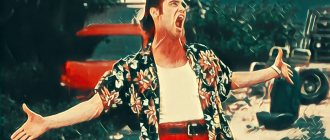Perhaps everyone, at least once, by bending masterfully, avoided falling on the ice or chose the right answer, following the “sixth sense”. We mistakenly say that we acted “instinctively,” but in fact, each of our unconscious decisions is the result of the work of the intellect, or rather, the experience accumulated over many, many years. The human brain is capable of making decisions so quickly that it seems to us that they are the product of evolution that lasted thousands of years, and our body itself “knows” what to do.
People often confuse instincts with desires, automatic actions or reflexes.
Meanwhile, instincts for millions of animals are the only program that ensures survival.
Instinct arises when it is necessary to satisfy a need for something, and preferably with minimal decision-making costs. To do this, the animal needs a genetically (or epigenetically) fixed, clear and fixed set of actions and a certain signal that will trigger it.
Instinct does not always look logical, but a representative of the fauna has no need to know about this.
For example, spiders weave a cocoon from a web to procreate in a strictly defined way: the bottom, then the walls, after which the insect lays eggs and covers them with a lid. If you send such a craftsman to another place when he has already made the base, the spider, following instinct, will resume work from the stage at which it stopped. The death of the offspring (and the eggs will fall out of the cocoon without a bottom almost immediately) does not bother him - the main thing is that he completed what was destined by instinct.
Invertebrates don’t like to think at all - they trust the ready-made program, and it turns out great for them. Bees, without training, build honeycombs so that they can hold as much honey as possible while using less wax. In addition, they instinctively find honey and instinctively transmit this information to their neighbors in the hive.
Their more vertebrate counterparts no longer possess such skills: dogs and cats can instinctively chase a moving object, but only chase, but to grab and eat is no longer instinct, but the result of learning.
Are we more complex than spiders?
Primates and especially humans went even further in development and finally lost the remnants of instincts. Our behavior is very complex, but our mind is more flexible, so we do not need a clear program, and we can choose the easiest and most suitable solution from several solutions. Thanks should be given to the highly developed frontal lobe of the brain, where the centers for controlling behavior and acquiring skills are located. Thanks to it, we can satisfy our needs as the situation requires, and not follow straight lines laid by distant ancestors.
Opponents object: without instincts, all people would have died out long ago - take, for example, the ability of babies to cry loudly and for a long time or sneeze because of the fluff in the nose! However, this is just a reflex - a very simple (or slightly complicated) signal from the body to irritation. In general, the diagram looks like this: receptor - neurons - performer (for example, muscle). A receptor on the hand, or in the eye, or on the surface of the skin detects some kind of irritation, but we cannot do anything about it. But our sensitive neurons urgently transmit signals to the spinal cord, where simple but effective solutions are already “ripening”: jumping away from the flame or crying, washing a speck out of the eye.. Everything is simple and fast, the question is the answer. People have a lot of reflexes: some we are already born with (newborns have a lot of them, but as they grow older, many of them fade away), others we acquire in the process of learning and gaining experience.
So if you hear about someone’s unprecedentedly developed “self-preservation instinct,” know that, most likely, this person’s reflex arc simply works perfectly, and people do not have such an “instinct.”
More precisely, not a single animal in the world has it. “Instinct of self-preservation” is a collective image of many actions that representatives of fauna perform to survive. This includes the ability for long seasonal flights in birds, and the reflexive withdrawal of a hand from a hot object.
What is this?
A long time ago, in Ancient Greece, thinkers and simply smart men noticed that it is human nature to react and behave in the same way in unsafe conditions. The instincts themselves are in the hemocode, and they consist of reflexes, which in turn are:
- Conditional - that is, those that a person acquired during his life. The simplest example is when you turn on the light as soon as you enter the room. You were not born with this knowledge and habit, but acquired it as you grew older. And now you don’t even notice how your hand reaches for the switch.
- Unconditional, respectively, those that we received at birth. It’s rare that someone doesn’t withdraw their hand after touching a hot frying pan or iron, right? This is an unconditioned reflex.
Instincts can be influenced by religion, law, norms and rules of behavior, education or lack thereof. For example, in a family where parents abuse overprotection, controlling every step of the child, then what kind of independence can we talk about? He won’t really understand in which situations he should be careful, and in which, on the contrary, he should show up.
Such stories most often have two versions of events.
First: a child, growing up, remains to live with his parents, since in order to create a family, you need at least a little independence and the ability to rely on yourself.
Second: he tries in every possible way to escape, becomes uncontrollable and aggressive towards those who care for him. The stories of the second option usually end more successfully.
To make it clearer how instincts can be influenced, let’s first look at what they are.
How do birds find their way south?
Speaking of birds. Twice a year, migratory birds accomplish something truly grandiose, if not impossible, and it is not only about overcoming vast distances, but also about choosing the direction of migration. They use many sources of information: the position of the sun and stars, some landmarks, and the planet’s magnetic field.
It seems that this is true instinct: having never been to a wintering place, the bird feels the need to fly exactly there. But in fact, young individuals do not immediately understand where they need to go, and only over time they comprehend the all-wise science of navigation. However, how this happens still remains a mystery. In some species, youngsters simply follow their flock, studying the route, while in others, apparently, the ability to choose the right direction is genetic (if you cross birds with different types of migration, the offspring may get lost).
So instinct is instinct, but it still needs to be learned. But the need to migrate clearly manifests itself instinctively: when the length of daylight changes, physiological changes are triggered in the birds’ bodies, which prompt them to prepare for migration, and then to fly.
Useful NOTES:
In general, the best way to win an argument is to avoid it. This idea, upon deep consideration, is devoid of excessive pacifism visible at first glance. The fact is that human nature is designed in such a way that we perceive any conflict as a challenge, and the more harmless this conflict is, the greater the temptation to accept this challenge without fear of consequences. If the discussion of a problem turns into an argument, then you should expect that your counterpart will do his best to search in his head (and often come up with) confirmation of his point of view, trying at all costs to destroy your arguments. If you initially try to convince your interlocutor in the form of a soft conversation, then in most cases you can avoid such a confrontation.
“First ask the person two simple questions to which he will be forced to answer “yes”; and only then ask him the third question that is important to you.” This rule will work with much greater force if questions that assume a positive answer are your arguments. Their number does not have to be equal to two - the more, the better (within reasonable limits). If you follow this simple rule, then when you express your main idea, the interlocutor will have to agree, since he himself has just argued this idea with his positive answers to the questions that make it up.
The rule of any discussion is to try to treat with sincere respect both the opponent himself and his point of view. If you put too much pressure and exert harsh psychological pressure, then your interlocutor may even pretend to agree with you (so that you leave him alone), but in reality he will not accept your opinion, remaining to his own. This may lead to a lack of mutual understanding in the future. Remember that there are as many opinions as there are people.
Sexual instinct or desire?
As we've discovered, instinct is often confused with desires and needs - especially when it comes to sexual desire. It would seem so easy to give in to the call of nature, hiding behind the great goal of reproduction, and leave your genes everywhere. And yet, “basic instinct” is nothing more than a person’s simple desire to receive pleasure (after all, almost every one of us first discovers masturbation, and only then sex with a partner).
If the need for intercourse was truly instinctive, then all people on Earth would do it in exactly the same way and, moreover, there would be a single signal of readiness on both sides (perhaps life would become easier).
Mammals are once again paying the price for big brains - and they even have to learn sex. Animals raised in captivity often do not perceive “signs of attention” from potential partners, and their attempts at physical intimacy are regarded as aggression and violence. Different-sex macaques raised outside the pack will most likely begin to groom each other (the classic program is mutual grooming and cuddling), but are unlikely to understand how and why to have sex. And if they do understand, then the female will face the next test - the birth of a baby and the high probability of its early death, because mammals have no instincts.
In psychology
The concept of instinct in relation to humans was developed within the framework of psychoanalysis, one of the provisions of which was the recognition of the role of biological prerequisites for behavior. Instincts within psychoanalysis were viewed as hereditary (non-acquired) tendencies that play the role of motivational forces in complex human behavior patterns.
Freudianism
Sigmund Freud categorically rejected the existence of instincts in the human psyche. In his lecture “Introduction to Psychoanalysis,” he said that human sexual behavior can only indirectly be similar to the sexual instinct in animals, while each person creates his own structure of sexual relationships. Considering each person individual, Freud did not consider it possible to generalize and average a person’s sexual experience, explaining it by instincts - this would be theoretically incorrect and practically erroneous. As the opposite of instinct, Freud developed the Drive Theory, first described in 1905 in Three Essays on the Theory of Sexuality.
According to Freud's ideas, all living organisms are characterized by oppositely directed desires for self-destruction and self-preservation. The tendency to aggression and destruction is determined by the attraction to death, while sexual attraction, self-preservation, and love are determined by the attraction to life. Freud explained the desire for self-destruction by a tendency to reduce nervous tension.
Humanistic psychology
Abraham Maslow argued that people do not have instincts because they can overcome their desires. He believed that what are described as "instincts" are in fact very strong motives for a certain type of behavior. In his opinion, instincts were characteristic of people in the past, but were subsequently replaced by consciousness.
Hormic psychology
According to hormic psychology, the source of motivation was a special intangible force “gorme”, manifested in the form of instincts. The concept of horme was developed by American psychologist William McDougall. He also developed his own classification of instincts.
- flight (fear);
- rejection (disgust);
- curiosity (surprise);
- aggressiveness (anger);
- self-deprecation (embarrassment);
- self-affirmation (inspiration);
- parental instinct (tenderness);
- food instinct;
- herd instinct;
The concepts of instinct in the theories of McDougall and Freud were based on subjective experiences and, as a result, lacked scientific rigor. In particular, they did not allow us to compile a list of instincts (McDougall repeatedly changed the number of instincts).
Is maternal instinct a fiction?
People (and representatives of our group in general) do not have a maternal instinct. Of course, even during gestation and after the birth of the baby, the body of each female individual undergoes strong changes. A gradual increase in the level of hormones, from human chorionic gonadotropin at first to prolactin in the end, can directly or indirectly affect the pituitary gland and hypothalamus, changing behavior: the animal becomes more stress-resistant, trust in others increases, the desire to create a “nest” and take care of someone becomes more intense. or. However, this is not a mandatory program, so the listed sensations in pregnant women may manifest themselves with varying strengths or be absent altogether.
And even childbirth does not make a female (or a woman, if we talk about people) a mother: in mammals, caring for the baby is an acquired behavior.
It depends on biological factors (hormones) to the same extent as on social ones - for example, the example of one’s own mother is of great importance. There are often cases when young female orangutans, having been orphaned early, never began to care for the cub (in zoos, in such situations, babies are looking for a foster mother).
The maternal instinct, which supposedly sleeps in every woman, probably disappeared long before the appearance of mammals.
But it is found in amphibians. In smooth guard frogs, however, the male takes care of the tadpoles, so the instinct is rather paternal, but the Surinamese pipa raises children, literally sacrificing its own back. Birds are ready to feed other people's chicks, ignoring their offspring, if only they open their beaks wider. This sometimes ends disastrously: the offspring die, and the foundlings (not only cuckoos, but also starlings and weaver birds) grow up and fly away, but the bird cannot resist the maternal instinct, no matter how much it wants. Perhaps it’s good that we don’t have one.
Differences from animals
The most basic difference is that a person is able to control or suppress his needs, especially in those moments when they contradict the law or rules of behavior. With various mental disorders, a person loses the ability to control, which manifests itself, for example, in excessive consumption of food, that is, overeating, or, conversely, refusal of it in case of anorexia, promiscuity, any type of addiction, etc. In such cases, a person becomes like an animal whose main instincts are preservation and procreation.
Animals do not know how to suppress their reflexes, they have no concept of morality, therefore a cat or dog during the period of heat is not selective in choosing a partner; on the contrary, the more of them there are, the higher the probability of having offspring.
Predators kill without feeling pity, just to get enough and feed their young; this, by the way, sometimes doesn’t really distinguish us from animals. Unfortunately, many people are capable of murder for their own gain. And in some ways, animals turn out to be more “humane”, in those cases when they show unspeakable fidelity, creating only one pair in their entire lives, and sometimes they are even ready to die if they lose a partner, or spend the rest of their days alone.
Are people completely devoid of instincts?
For a long time, scientists said that we have only one real instinct: when unexpectedly meeting a sympathetic person, representatives of different cultures raised their eyebrows for ⅙ seconds the same way. Moreover, children blind from birth did the same at the sound of a familiar and pleasant voice.
But in 2021, an article was published whose authors state that, apparently, the fear of spiders and snakes without a twinge of conscience can also be called instinctive. This was tested on innocent babies who had never encountered either animal: the children were shown a series of images (flowers and spiders, snakes and fish) similar in color and shape. And it turned out that when looking at “dangerous” pictures, the pupils dilated more strongly. This indicates the launch of the norepinephrine system, which is activated in response to a frightening stimulus.
Researchers have decided that fear of dangerous animals may be embedded in us at the genetic level.
It was more profitable for ancient man to be scared and immediately run away from a potentially poisonous animal. This knowledge somehow took root and, apparently, has survived to this day. So it’s no wonder that arachnophobia and ophiophobia (fear of spiders and snakes, respectively) are constantly included in the list of the most common fears of mankind.
Of course, sometimes you want to justify behavior by referring to the call of nature or attributing everything to biological heritage, but do not forget: for many thousands of years, man has been shaped by society; we have become what we are thanks to constant learning and thinking. All this helped us survive and begin to dominate the world. A person’s instincts have disappeared a long time ago, and even if it seems that this particular action is precisely dictated by nature, no, someone just has problems with self-control.
Biological and social in man
In relation to humans, it is customary to speak not about instincts, but about species memory. It can be genetic, passed on from generation to generation, and cultural - the heritage of society.
If some instincts are present, for example, aggression, sexuality, then society suppresses them. Thus, monogamy is the result of socialization, the cultivation of the individual.
Animal instincts in a person are activated when primary biological needs are unsatisfied: food, safety, sleep, shelter, sex. Of course, consciousness, learned norms, values, and culture begin to fight instincts.
According to the theory of William McDougall, a person retains several instincts:
- running away when afraid;
- disgust, rejection;
- anger, often with fear;
- embarrassment;
- inspiration;
- parental;
- food;
- gregarious.
Why then, for example, does not the maternal instinct arise in all women? Psychotherapists claim that feeding a child and communicating with him in the first day after birth triggers the maternal instinct. If the contact happened later, then the instinct will not manifest itself. It is likely that other instincts also manifest themselves under certain conditions.
In other theories, the classification of human instincts is supplemented by the following types:
- procreation;
- altruism;
- dominance;
- study;
- Liberty.
In my opinion, a person has three main instincts.
Kinds
1. The most basic and basic thing is self-preservation
If for some reason it is not weakened, then your behavior will not be risky, gambling and destructive. For example, you will not climb into a cage with tigers, you will not jump without a parachute and provoke a group of athletes. Even at birth, a child unconsciously reaches out to his mother, experiencing great anxiety if he is left alone, because his life depends on others. That is why babies begin to smile so early, rejoicing at the approach of someone who cares, so that the desire to be picked up and approached to the crib more often does not fade away.
3.Altruism
The first two reflexes were the main ones that help a person survive. Now let's move on to more social ones, ensuring socialization and successful activities. And the first will be altruism, which is expressed in caring for others, both people and animals, this is compassion and empathy, the desire for peace and goodness. When it is strongly expressed, a person is able to devote his life to caring for those who need it, but not just devote it, but make a sacrifice, for example, by going to a monastery.
4.Research
Aimed at developing a person, both creatively and in other areas. Thanks to curiosity, young children learn about the world, and depending on the environment in which they grow up, their abilities and aspirations develop. Examples of successful research activities for which they were not punished, but encouraged, are great scientists, travelers, famous creative personalities and other people following their interest.
5.Dominance
This is the need for leadership and power. People who have a pronounced dominance are able to lead a crowd, organize and manage. Have you noticed that even in the company of small children there is always a “ringleader”? No group can do without a leader, even an indirect one. It often happens that a person who has previously had no leadership experience, finding himself in a company in which power has not yet been distributed, takes the honorable place of leader
And it doesn’t matter in what way, either he wins the championship himself, or is chosen by the other participants
6. Maintaining your dignity
Only in an exaggerated form people sometimes ignore their innate instincts. For example, they are ready to risk their health and life in order to defend their honor or rightness. When the level is very weak, then a person has low self-esteem, as a result of which he allows not only humiliation towards himself, but also violence. There are often cases when a self-confident woman begins a relationship with a tyrant who constantly devalues her, bringing her to such a state that she really stops believing in her strength, intelligence and attractiveness. He becomes a victim who is now easy to manipulate and control, because he will endure everything.
7.Freedom and independence
It appears in infancy, when trying to swaddle a newborn, during normal development. During rebellion in adolescence, if it is not suppressed. Thanks to the need for freedom, a person develops social skills, increases the likelihood of success, creating a family and, in general, a high-quality independent life. A person is able to bear responsibility and rely on himself, as he has experience.










